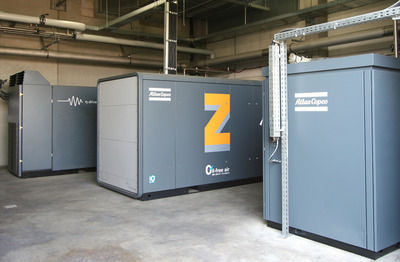Compressed air plus heat recovery for PET bottle production
Monday, 03 March, 2014
Founded in 1950 in the German town of Bad Griesbach, Schwarzwald-Sprudel now employs 60 people on two bottling lines, filling 160 million PET bottles each year. An Atlas Copco compressed air station enables the company to produce and use its compressed air in a particularly efficient manner.
Using the stretch blow-moulding method, Schwarzwald-Sprudel takes preforms made of polyethylene terephthalate (PET) and blows them into beverage bottles. This method requires a great deal of compressed air and a high level of pressure.
The compressed air supply at Schwarzwald-Sprudel is based on three ZR screw compressors, two of which are equipped with speed regulation (VSD - variable speed drive), as well as two speed-regulated boosters. These components supply the two bottling lines with compressed air. The system is of such a scale that the facility has almost 1000 kW of installed power, even though the machines may never run all at the same time.

The air for the stretch blow-moulding process is first compressed to around 8.5 bar by a screw compressor before being further compressed to 29 bar by one of the boosters.
All components used to produce compressed air operate entirely without oil. For instance, the DN 160 type booster piston compressor and the ZR screw compressors both deliver oil-free air in accordance with ISO 8573-1, Class 0 (2010). An ES 130 energy-saving system controls the entire compressed air system in such a way that the compressors run as close as possible to their optimum operating point - in particular, the speed-regulated compressors.
“We set the system in such a way that, for six months of the year over winter, it is primarily the new ZR 250 VSD-FF with heat recovery that is running - in this way, we are able to re-use as much heat as possible for heating tasks,” said Bernhard Griesau, Schwarzwald-Sprudel plant manager.
Heat recovery forms part of the company’s sustainable energy management strategy. In essence, the power absorbed by the pressure during compression is converted into heat. This heat is almost entirely recovered and used for heating water.
“We use this method primarily to support the heating in the halls and, to a lesser degree, to heat process water,” Griesau said.
Schwarzwald-Sprudel relies on a premium maintenance agreement with Atlas Copco to service the compressed air production system. In addition to the necessary inspections and maintenance, this agreement also comprises free repair for any damage that occurs, up to and including a complete general overhaul.
Onion producer redevelops its post-harvest operations
Recognising a need to improve the efficiency of its post-harvest operations whilst maintaining...
Carrot wash line processes 40 tons per hour
The Lamattina carrot wash line processes 40 tons per hour (with a capability up to 60 tons per...
How to prevent food factory fires with smarter machine monitoring
Food processors can deter fire-prone production conditions with testing to ensure safety and...














